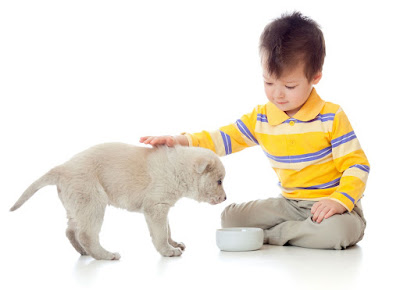Puppy training is a life-long process. Puppies learn very quickly with proper instruction. The first few hours with your new puppy will make an indelible impression on your young dog, and the precedents you set now in training your puppy will usually last a lifetime.
The family members in the household must accept responsibility.
Decide on the rules and agree upon a routine for the care of the new family member. While everyone is excited and thrilled to have the new puppy in the house, puppy training starts as soon as the new dog enters the home.
Whether or not you are aware of it, you and the family have already begun to teach the young arrival, although it is not to say that your unintended puppy training has been all for the good. The unintended consequences of your puppy training may be that you and the family have already taught through example that it is perfectly fine to be on the couch. Your puppy training, although unintended, may have begun to reinforce that it is fine not be in the crate for the night's sleep, but instead to be on the bed, only to find that on a subsequent night the puppy will cry when put in its crate.
Puppy training is happening by your action involving the puppy and the puppy's observations of its new pack members. The puppy will regard you and the family as its new pack. What you do correctly and not do correctly in the early stages will affect your dog's behavior for the coming years.
Puppy training requires that you play a dual role of caring and loving guardian, and strong leader.
If you do not take up the role of leader, your dog will, and you will end up with a disobedient dog that can be a real problem. Lots and lots of affection is a wonderful thing for most puppies, but it must be tempered with the discipline of authority.
The puppy has recently been separated from its littermates and feels vulnerable and is very impressionable. Puppy training begins with its first observations and will continue through its entire life. Puppy training also entails picking up the education process where the dog's mother left off. Mouthing and biting is a common practice in puppies and young dogs in play and teething. Training the puppy to refrain from mouthing and biting would normally be learned from its mother and littermates, but since your puppy has been removed from that environment before the lesson has been learned, this part of training must be completed by the puppy's new guardians.
If you wish to develop a well-adjusted dog, puppy training must involve learning how to act around children and vice versa. It includes learning how to behave around adults and other animals as well. An improperly socialized puppy can grow to be aggressive and/or fearful. A well socialized puppy is well-adjusted and makes a wonderful companion.
Puppy training is giving your dog an education.
It is important to set good examples from the beginning. Few things are more demanding of your time in the early days than properly educating your new puppy. It is important to spend as much time as possible with the dog. Play with the new puppy gently and quietly, avoiding loud noises and overwhelming the young dog with aggressive attention and activity. Puppies require a lot of sleep as babies do, so when the dog appears tired allow it to rest. When done well, your training experience will be a wonderful memory you will cherish for years to come.
Source:http://ezinearticles.com/?Puppy-Training-Done-Right&id=965933






No comments:
Post a Comment